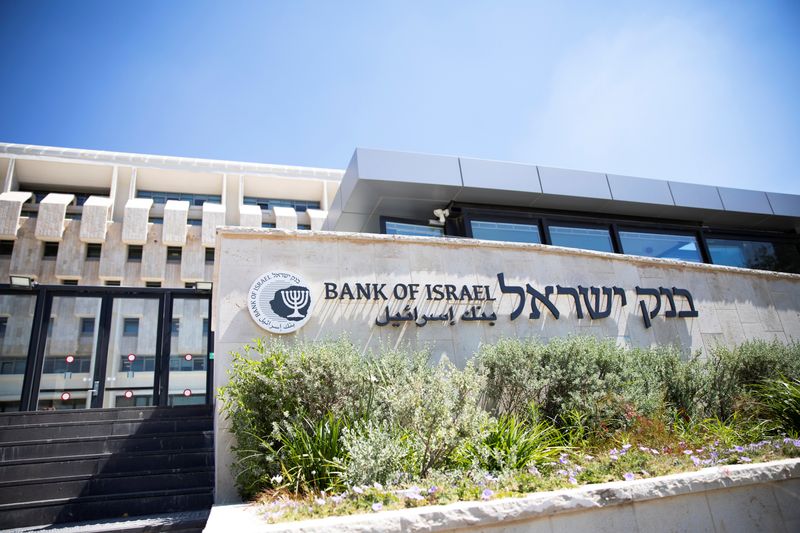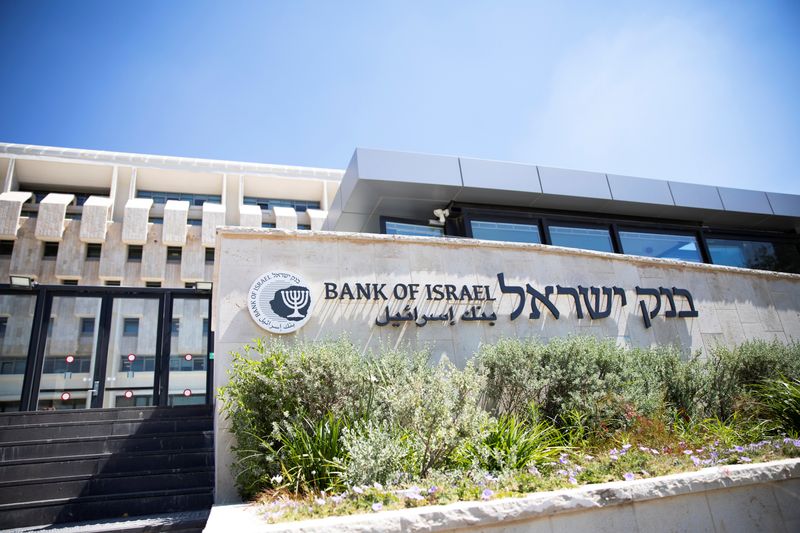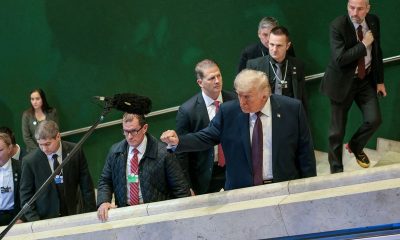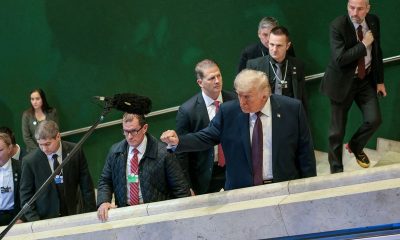Economy
Bank of Israel pauses rate hikes but warns further rises possible


© Reuters. FILE PHOTO-The Bank of Israel building is seen in Jerusalem June 16, 2020. Picture taken June 16, 2020. REUTERS/Ronen Zvulun/file photo
By Steven Scheer and Ari Rabinovitch
JERUSALEM (Reuters) -The Bank of Israel left short-term borrowing rates unchanged on Monday for the first time since early 2022, as expected, but warned that rates could be hiked further if inflation picked up again.
Governor Amir Yaron said that rates would remain high for some time. He also cautioned that legislation on a highly-disputed bill that is part of the government’s judicial overhaul plan, and which is being advanced in parliament on Monday, will carry an economic price.
The central bank kept its benchmark rate at 4.75% – its highest level since late 2006. It had raised rates 10 straight times in an aggressive tightening cycle that has taken the rate from 0.1% last April.
Of 19 economists polled by Reuters, 14 had expected no rates move, although analysts are split as to whether the tightening cycle has ended.
Similarly, the U.S. Federal Reserve held its policy rate steady last month but is widely expected to raise rates later in July.
Yaron himself said much depends on inflation, which eased to 4.6% in May from 5% in April, well above the government’s 1%-3% annual target range. The bank’s staff projected inflation would stand at 3.0% in the next four quarters and end 2024 at 2.4%.
“If we see the environment does not converge in the way we thought … we won’t hesitate to keep raising the interest rate,” Yaron said at a news conference. “We estimate that we will need to keep the interest rate at a fairly high level for a while.”
At the outset of the rate hike cycle, policymakers believed a rate of just above 3% would suffice to rein in prices. But a combination of supply chain issues, high demand and a more than 7% depreciation of the shekel versus the dollar mean inflation has not declined as fast as anticipated.
The shekel recovered losses of 0.5% versus the dollar after the decision and Yaron’s comments on more possible hikes.
The central bank has warned for months that the shekel was taking a hit from the government’s handling of its judicial overhaul. Yaron said that an “excess depreciation” of the shekel had contributed up to 1.5 percentage points to inflation.
The central bank has relied on interest rates to rein in inflation and has so far kept away from other tools, like intervening in the foreign exchange market.
Goldman Sach analyst Tadas Gedminas said the monetary panel balanced concerns over a weaker shekel by maintaining a “hawkish bias.” He believes that by the next rate decision on Sept. 4 inflation could ease to below 4%. “We think that inflation has now peaked and … that it is on track to decline gradually over the remainder of the year,” he added.
Yaron finishes his term at the end of 2023. He said he will decide whether to bid for a second five-year term around the Jewish holidays in September-October. It is unclear whether Prime Minister Benjamin Netanyahu will ask him to stay on.
The central bank’s economists foresee the key rate at 4.75% or 5% in the next year. They also forecast economic growth of 3% in both 2023 and 2024 – down from 6.5% last year – while Yaron noted that a tight jobs market persists.
The bank said growth could be threatened if the contested Israeli judicial reforms caused an adverse reaction in Israeli financial markets.
Economy
Russian central bank says it needs months to make sure CPI falling before rate cuts -RBC


© Reuters. Russian Central Bank Governor Elvira Nabiullina attends a news conference in Moscow, Russia June 14, 2019. REUTERS/Shamil Zhumatov/File Photo
MOSCOW (Reuters) – Russia’s central bank will need two to three months to make sure that inflation is steadily declining before taking any decision on interest rate cuts, the bank’s governor Elvira Nabiullina told RBC media on Sunday.
The central bank raised its key interest rate by 100 basis points to 16% earlier in December, hiking for the fifth consecutive meeting in response to stubborn inflation, and suggested that its tightening cycle was nearly over.
Nabiullina said it was not yet clear when exactly the regulator would start cutting rates, however.
“We really need to make sure that inflation is steadily decreasing, that these are not one-off factors that can affect the rate of price growth in a particular month,” she said.
Nabiullina said the bank was taking into account a wide range of indicators but primarily those that “characterize the stability of inflation”.
“This will take two or three months or more – it depends on how much the wide range of indicators that characterize sustainable inflation declines,” she said.
The bank will next convene to set its benchmark rate on Feb. 16.
The governor also said the bank should have started monetary policy tightening earlier than in July, when it embarked on the rate-hiking cycle.
Economy
China identifies second set of projects in $140 billion spending plan


© Reuters. FILE PHOTO: Workers walk past an under-construction area with completed office towers in the background, in Shenzhen’s Qianhai new district, Guangdong province, China August 25, 2023. REUTERS/David Kirton/File Photo
SHANGHAI (Reuters) – China’s top planning body said on Saturday it had identified a second batch of public investment projects, including flood control and disaster relief programmes, under a bond issuance and investment plan announced in October to boost the economy.
With the latest tranche, China has now earmarked more than 800 billion yuan of its 1 trillion yuan ($140 billion) in additional government bond issuance in the fourth quarter, as it focuses on fiscal steps to shore up the flagging economy.
The National Development and Reform Commission (NDRC) said in a statement on Saturday it had identified 9,600 projects with planned investment of more than 560 billion yuan.
China’s economy, the world’s second largest, is struggling to regain its footing post-COVID-19 as policymakers grapple with tepid consumer demand, weak exports, falling foreign investment and a deepening real estate crisis.
The 1 trillion yuan in additional bond issuance will widen China’s 2023 budget deficit ratio to around 3.8 percent from 3 percent, the state-run Xinhua news agency has said.
“Construction of the projects will improve China’s flood control system, emergency response mechanism and disaster relief capabilities, and better protect people’s lives and property, so it is very significant,” the NDRC said.
The agency said it will coordinate with other government bodies to make sure that funds are allocated speedily for investment and that high standards of quality are maintained in project construction.
($1 = 7.1315 renminbi)
Economy
Russian central bank says it needs months to make sure CPI falling before rate cuts -RBC


© Reuters. Russian Central Bank Governor Elvira Nabiullina attends a news conference in Moscow, Russia June 14, 2019. REUTERS/Shamil Zhumatov/File Photo
MOSCOW (Reuters) – Russia’s central bank will need two to three months to make sure that inflation is steadily declining before taking any decision on interest rate cuts, the bank’s governor Elvira Nabiullina told RBC media on Sunday.
The central bank raised its key interest rate by 100 basis points to 16% earlier in December, hiking for the fifth consecutive meeting in response to stubborn inflation, and suggested that its tightening cycle was nearly over.
Nabiullina said it was not yet clear when exactly the regulator would start cutting rates, however.
“We really need to make sure that inflation is steadily decreasing, that these are not one-off factors that can affect the rate of price growth in a particular month,” she said.
Nabiullina said the bank was taking into account a wide range of indicators but primarily those that “characterize the stability of inflation”.
“This will take two or three months or more – it depends on how much the wide range of indicators that characterize sustainable inflation declines,” she said.
The bank will next convene to set its benchmark rate on Feb. 16.
The governor also said the bank should have started monetary policy tightening earlier than in July, when it embarked on the rate-hiking cycle.

 Forex4 years ago
Forex4 years agoForex Today: the dollar is gaining strength amid gloomy sentiment at the start of the Fed’s week

 Forex3 years ago
Forex3 years agoUnbiased review of Pocket Option broker

 Forex3 years ago
Forex3 years agoDollar to pound sterling exchange rate today: Pound plummeted to its lowest since 1985

 Forex3 years ago
Forex3 years agoHow is the Australian dollar doing today?

 Cryptocurrency3 years ago
Cryptocurrency3 years agoWhat happened in the crypto market – current events today

 World3 years ago
World3 years agoWhy are modern video games an art form?

 Commodities3 years ago
Commodities3 years agoCopper continues to fall in price on expectations of lower demand in China

 Economy3 years ago
Economy3 years agoCrude oil tankers double in price due to EU anti-Russian sanctions

























